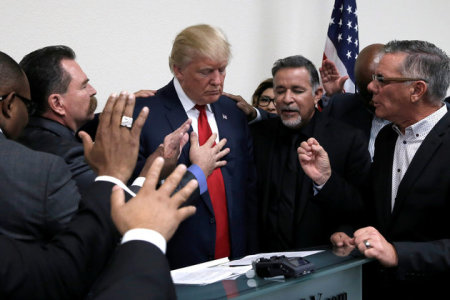Type of Christians key to Trump victory less likely to pray for him: Barna

The Christians that the Barna Group believes were key to President Donald Trump's 2016 victory, due to their movement away from Democrats, do not largely pray for the commander-in-chief, according to the evangelical research organization.
Earlier this month, Barna released a report that included a compilation of recent research that they conducted on various politics-related issues.
Among their findings, Barna reported that as of early 2017, around the time Trump was sworn in as president, 37 percent of American adults said they pray for the president.
"Evangelicals were the group most active in their prayer, along with majorities of groups with an active Christian faith," noted Barna earlier this month.
"These prayers were just as common among black Americans as among white Americans, but less common among those who profess a non-Christian faith or fall into the category of notional Christians."
Barna defines "notional Christians" as people who identify as Christian and likely attend church, but do not consider themselves to be "born-again."
Barna found that while their research indicated that "Notional Christians" were a key factor in Trump being elected, only 35 percent report praying for the president.
According to Barna's post-election report, "perhaps the most significant faith group in relation to the Trump triumph was notional Christians. These individuals ... have supported the Democratic candidate in every election since 1996. On average, notionals have given the Democratic candidate 58 percent of their votes. That trend was broken this year as Hillary Clinton took just 47 percent of the group's votes while Trump was awarded 49 percent. Given that notionals are by far the largest of the five faith segments, that transition was a game changer for the Republicans."
Among evangelical Christians, a group that strongly supported Trump, 88 percent reported praying for Trump. By contrast, 18 percent of non-Christian religious believers reported praying for the president.
Unlike most polling on evangelicals, Barna defines evangelicals based upon beliefs, a set of nine questions, rather than self-identification.
Barna drew from a 2017 survey of 1,109 American adults with a sampling error of plus or minus 2.9 percent.
The survey was one of multiple recent findings that Barna highlighted in response to the midterm elections, with the organization explaining that they believed this and other findings "may help provide context—or prompt more questions—about our present political moment."
Last year, it was reported that some theologically liberal churches, All Saints Episcopal Church of Pasadena, California among them, were going to refuse to state Trump's name in their prayers for him.
"We are in a unique situation in my lifetime where we have a president elect whose name is literally a trauma trigger to some people," said All Saints Church Rector Mike Kinman, as reported by local media outlet Pasadena Now in 2017.
"Whereas before we prayed for 'Barack, our president,' we are now praying for 'our president, our president elect, and all others in authority.' This practice will continue for at least the near future."
The Rev. Alice Rose Tewell, associate pastor at The New York Avenue Presbyterian Church in Washington, D.C., told The Christian Post in an interview last year that her congregation will "pray for our political leaders from all backgrounds during our worship service."
"We have and we will continue to pray that our next president would act on with justice and mercy for each person throughout our nation and the world," said Tewell.
"We pray that our next president will turn from the rhetoric of his campaign and instead stand up for the rights of the immigrant and refugee, the rights of women and children, the rights of people of color, the rights of those who live with disabilities, the rights of the LGBTQ community, for the rights of those living without homes or in unstable conditions, and for all who are lack enough opportunity, chances at a good education, and healthcare."





















